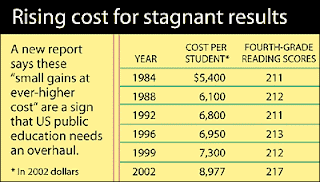Reform News Roundup
From the October 2007 School Reform News whch hit my mailbox yesterday:
NEA Moves Even Further from Mainstream at Annual convention. This headline isn't even news anymore but there is some encouraging information in the article.
"Rank-and-file teachers are becoming increasingly fed up with the far-left policies the NEA adopted...so fed up that some of them are planning to become delegates themselves in order to change the union's makeup."I've always thought Mike Antonnuci's NEA Pyramid was very illustrative of the disconnect between the NEA leadership and the rank-and-file. Good to read that people are trying to reform the old gal. Of course there are options: Professional Educators of Tennessee. (I see they've redone their website. Nice.)
"Conservative teachers must not 'sit idly back and pay dues,' [Sissy] Jochmann said. "It's unconscionable,' she continued, for state members to do nothing while the NEA continues to 'adopt non-education policies regarding social issues...'
Civic Group Finds Illinois Charter Schools Don't Drain Resources. The first argument out of the mouths of those who don't want this education choice available is that it will drain resources from public schools (actually educating children isn't the highest priority).
"The 112-page assessment focused on three Illinois charter schools outside the Chicago Pulbic School system that had weathered a time of financial hardship for their host districts. During the 2003-04 school year, on which the study focused, the three schools relieved their host district of 1.3 to 3 percent of the district's students while tapping only 0.9 to 2.4 percent of their host districts' operating budget.and
"We're finding the same is generally true nationwide," [Don] Soifer [Exec. Director of the Lexington Institute] said. "Charter schools do not drain district funding."Congress May Act to Define Graduation Rate: You had to know this was coming. Our own MNPS has modified its definition of graduation. I don't believe they're the only ones to think of it. Changing the definitions, the tests, the way we report the information are all tried and true tactics of those who want to hide the truth.
"Sadly, dishonest reporting about graduation rates turns out to be widespread," wrote Larry Ozzell in a 2005 Cato Institute policy brief."Two bills are being introduced that would 'require accurate information regarding dropout and graduation rates.' They only mention one in this article HR2955. Here's a printer friendly version of the bill.
From the Bill:
"Approximately one-third of all high school students in the United States fail to graduate with their peers--about 1,230,000 every year." That's ONE MILLION, two hundred thirty thousand lives handicapped by not getting the education they need EVERY YEAR. I'll never understand the push for Pre-K when more than ONE MILLION of our citizens need help NOW. 4 year olds have some time. These one million students have run out of time.
"About 2,000 of the more than 20,000 high schools in the United States produce nearly half of the Nation's dropouts."Let's Marshal Plan those 2,000.
"The average gap between State-reported and independently reported graduation rates is approximately 11 percent, and in some States that difference rises to over 25 percent."For federal legislation it's a pretty easy read. I encourage you to go through it and let your representative know how you'd like them to vote.
And finally we have a Democratically controlled congress and so that means no more choice for those that could really use it.
DC Opportunity Scholarship Program's Future in Question.
"The DC Opportunity Scholarship program has been providing low-income students private school scholarship since 2004 when President George W. Bush signed into law the federal DC School Choice Incentive Act."
And this quote...really, this is what the DC delegate thinks is the ONLY responsible thing to do?
"I think there's very little chance that, when this runs out, it will be renewed," commented Del. Eleanor Holmes Norton, who represents the District in Congress. "I have said to [Washington Scholarship Fund] that I think the only responsible thing to do is to prepare the parents to understand that the program is unlikely to be funded, that it was experimental, it was never meant to be permanent."and
"Del. Norton needs to talk to parents," Walden Ford [Exec. Director, DC Parents for School Choice] said. "Parents with children in the program are thrilled about the new opportunities in private school. They are so happy to have their children in safe and high-quality schools."This is what she calls doing a good job advocating for her constituents? And she wants a vote in the House. I don't think so. It's not like they're asking for their children to attend Sidwell Friends or St. Albans.

